
Cultural imperialism comprises the cultural dimensions of imperialism. The word "imperialism" describes practices in which a country engages culture to create and maintain unequal social and economic relationships among social groups. Cultural imperialism often uses wealth, media power and violence to implement the system of cultural hegemony that legitimizes imperialism.
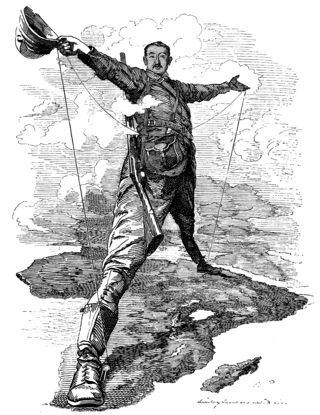
Imperialism is the practice, theory or attitude of maintaining or extending power over foreign nations, particularly through expansionism, employing both hard power and soft power. Imperialism focuses on establishing or maintaining hegemony and a more or less formal empire. While related to the concepts of colonialism, imperialism is a distinct concept that can apply to other forms of expansion and many forms of government.
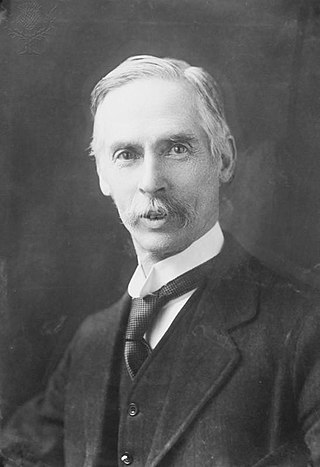
John Atkinson Hobson was an English economist and social scientist. Hobson is best known for his writing on imperialism, which influenced Vladimir Lenin, and his theory of underconsumption.

Bernard Lewis, was a British American historian specialized in Oriental studies. He was also known as a public intellectual and political commentator. Lewis was the Cleveland E. Dodge Professor Emeritus of Near Eastern Studies at Princeton University. Lewis's expertise was in the history of Islam and the interaction between Islam and the West.
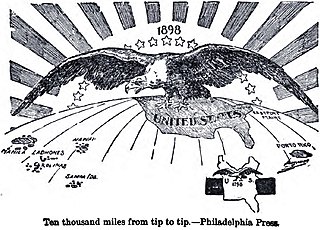
American imperialism is the expansion of American political, economic, cultural, media, and military influence beyond the boundaries of the United States of America. Depending on the commentator, it may include imperialism through outright military conquest; military protection; gunboat diplomacy; unequal treaties; subsidization of preferred factions; regime change; economic or diplomatic support; or economic penetration through private companies, potentially followed by diplomatic or forceful intervention when those interests are threatened.

George Macaulay Trevelyan was a British historian and academic. He was a Fellow of Trinity College, Cambridge, from 1898 to 1903. He then spent more than twenty years as a full-time author. He returned to the University of Cambridge and was Regius Professor of History from 1927 to 1943. He served as Master of Trinity College from 1940 to 1951. In retirement, he was Chancellor of Durham University.

Fouad A. Ajami was a Lebanese-born American university professor and writer on Middle Eastern issues. He was a senior fellow at Stanford University's Hoover Institution.
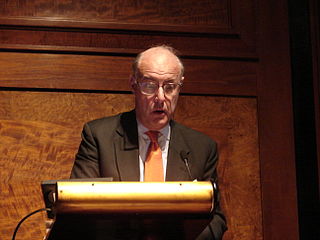
Sir David Nicholas Cannadine is a British author and historian who specialises in modern history, Britain and the history of business and philanthropy. He is currently the Dodge Professor of History at Princeton University, a visiting professor of history at Oxford University, and the editor of the Oxford Dictionary of National Biography. He was president of the British Academy between 2017 and 2021, the UK's national academy for the humanities and social sciences. He also serves as the chairman of the trustees of the National Portrait Gallery in London and vice-chair of the editorial board of Past & Present.

Hans-Ulrich Wehler was a German left-liberal historian known for his role in promoting social history through the "Bielefeld School", and for his critical studies of 19th-century Germany.

The Assassins: A Radical Sect in Islam is a book, first published in 1967, written by Middle-East historian Bernard Lewis, and published by Weidenfeld & Nicolson. An updated edition was published by Oxford University Press in 1987, and another in 2002 by Basic Books.

Imperialism: A Study (1902), by John A. Hobson, is a politico-economic discourse about the negative financial, economic, and moral aspects of imperialism as a nationalistic business enterprise. Hobson argues that capitalist business activity brought about imperialism.
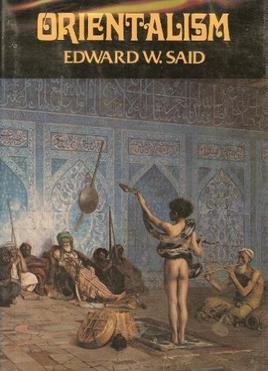
Orientalism is a 1978 book by Edward W. Said, in which the author establishes the term "Orientalism" as a critical concept to describe the West's commonly contemptuous depiction and portrayal of The East, i.e. the Orient. Societies and peoples of the Orient are those who inhabit the places of Asia, North Africa, and the Middle East. Said argues that Orientalism, in the sense of the Western scholarship about the Eastern World, is inextricably tied to the imperialist societies who produced it, which makes much Orientalist work inherently political and servile to power.

Antony Gerald Hopkins, is a British historian specialising in the economic history of Africa, European colonialism, and globalisation. He is Emeritus Smuts Professor of Commonwealth History at the University of Cambridge, an Emeritus Fellow of Pembroke College, Cambridge and a fellow of the British Academy.

The historiography of the British Empire refers to the studies, sources, critical methods and interpretations used by scholars to develop a history of the British Empire. Historians and their ideas are the main focus here; specific lands and historical dates and episodes are covered in the article on the British Empire. Scholars have long studied the Empire, looking at the causes for its formation, its relations to the French and other empires, and the kinds of people who became imperialists or anti-imperialists, together with their mindsets. The history of the breakdown of the Empire has attracted scholars of the histories of the United States, the British Raj, and the African colonies. John Darwin (2013) identifies four imperial goals: colonising, civilising, converting, and commerce.

Robert Roberts was an English teacher, writer and social historian, who penned evocative accounts of his working-class youth in The Classic Slum (1971) and A Ragged Schooling (1976).
David Kenneth Fieldhouse, FBA was an English historian of the British Empire. Fieldhouse was born to missionary parents in Mussoorie, northern India. He was sent to England for his education at Dean Close School, Cheltenham, from 1938 to 1943. Fieldhouse then completed naval service, before reading history at The Queen's College, Oxford.
John MacDonald MacKenzie is a British historian of imperialism who pioneered the study of popular and cultural imperialism, as well as aspects of environmental history. He has also written about Scottish migration and the development of museums around the world. He is Emeritus Professor of imperial history at Lancaster University and founder of the Manchester University Press ‘Studies in Imperialism’ series (1984).
Oriental Despotism: A Comparative Study of Total Power is a book of political theory and comparative history by Karl August Wittfogel (1896–1988) published by Yale University Press in 1957. The book offers an explanation for the despotic governments in "Oriental" societies, where control of water was necessary for irrigation and flood-control. Managing these projects required large-scale bureaucracies, which dominated the economy, society, and religious life. This despotism differed from the Western experience, where power was distributed among contending groups. The book argues that this form of "hydraulic despotism" characterized ancient Egypt and Mesopotamia, Hellenistic Greece and imperial Rome, the Abbasid Caliphate, imperial China, the Moghul empire, and Incan Peru. Wittfogel further argues that 20th century Marxist-Leninist regimes, such as the Soviet Union and People's Republic of China, though they were not themselves hydraulic societies, did not break away from their historical condition and remained systems of "total power" and "total terror".

Victorious Century: The United Kingdom, 1800–1906 is a book by David Cannadine, the Dodge Professor of History at Princeton University and President of the British Academy. The book is about the Victorian era in nineteenth-century Britain. It begins with the Act of Union in 1800 and ends with the Parliamentary victory of the Liberal Party in 1906. Cannadine opens with the Charles Dickens' quote, "It was the best of times, it was the worst of times." He argues that Britain maintained its status as leader of the global economy and possessor of the largest navy in the world. At the same time, the country was plagued by internal problems and social conflicts. According to the Whig Interpretation of history, the "victorious century" represented a time of expanding democracy and wave of Parliamentary acts providing political reform and universal manhood suffrage. Cannadine argues,
"This was a country which saw itself at the summit of the world. And yet it was a society also convulsed by doubt, fear and introspection. Repeatedly, politicians and writers felt themselves to be staring into the abyss and what is seen as an era of irritating self-belief was in practice obsessed by a sense of its own fragility, whether as a great power or as a moral force. Victorious Century catches the relish and humour of the age, but also the dilemmas of a kind with which we remain familiar today."
Priya Satia is an American historian of the British Empire, with a particular focus in the Middle East and South Asia. Satia is the Raymond A. Spruance Professor of International History at Stanford University. She was educated at Stanford and the London School of Economics and received her PhD from the University of California, Berkeley in 2004. Satia grew up in Los Gatos, California.
















